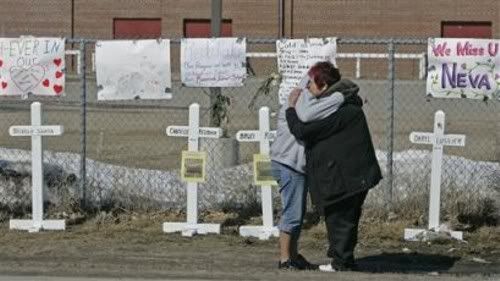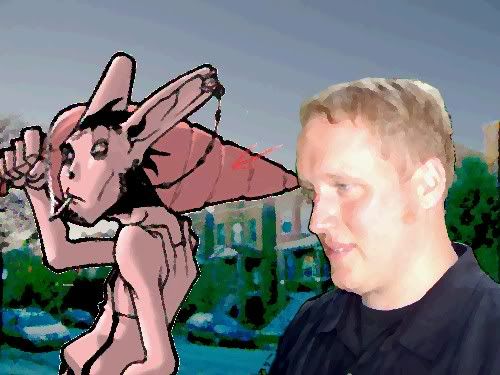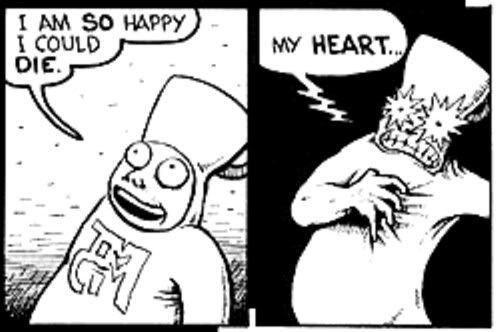I'm not clear why you answered in the negative my last question. And so I put it again - why shouldn't someone have the right to determine that her or his life is not worth living? I'm not suggesting a free-for-all. It is an important decision. But isn't someone's psychological welfare important as well? If I know I'm going to die within a few weeks, why shouldn't I be allowed to plan for and orchestrate my own demise? Why is that so horrible? I understand the suicide point - and it's a good one that all the right-to-die people should keep in mind.
There's also a matter of fundamental fairness here: I didn't choose to enter this world (at least I don't think I did); but shouldn't I be able to choose to leave?
Like one of the quoted columnists, I'm uncomfortable with the Schiavo case because of the lack of written instructions. There is a solemnity (or should be) in properly documenting those sorts of wishes - a solemnity which should prompt careful thought. I'm uncomfortable with finding those wishes expressed in conversations.
Let me try to put my rational hat on for a moment. Suicide prevention was my area of professional interest before I discovered my true calling in the growing field of government bureaucracy. So my responses tend to be visceral rather than reasoned and intellectual. It's like that with memories formed on a lot of adrenaline.
First, I don't believe the government should forbid people who are dying from hastening the process in the interest of reducing suffering. What I disagree with is the proposition that ending one's life is an enforcable moral "right." Right now the state government decrees that you are not allowed to drive faster than 65 miles an hour on the expressway. It used to be 55. The government is fully within its powers to dictate that the speed limit shall be 30 miles an hour. This would be a bad policy. I would not support that policy. But that does not mean you have an inalienable right to drive at 65 miles an hour.
The government, and the society it represents, has a compelling interest in preventing you from killing yourself under most circumstances. It is the same interest it has in preventing you from killing your neighbors, no matter how annoying they are or how early on Saturday morning they insist on mowing the yard. There may be circumstances under which society chooses to allow you to end your life. I believe there are. But the subject is a legitimate one for public debate and public policy, not a right with which the government has no authority to meddle. Establishing a right to end your life at any point where you feel it is no longer worth living would make suicide a right for all people, not just those with terminal illnesses. Remember, most people who kill themselves are not terminally ill.
Second, most suicidal people don't really want to die. The law has long allowed people to plead not guilty by reason of insanity for some serious crimes. Often this has included the concept of "temporary insanity." Why should an insane person not be found as guilty as a sane person committing the same act? Because they were in an abnormal mental state in which they were not acting rationally, did not understand the consequences of their actions, etc. Suicide attempts almost always occur in such an excited, temporary state. Once the crisis has passed, the suicidal person generally does not want to die, and is relieved that the attempt failed (although the do remain at risk for future crises). Establishing a right for such people to kill themselves will allow them to take an action that does not reflect their true wishes while they are not in their right minds. Doing so would be very bad policy indeed.
Third, in modern society, your life is not your own. You did not go out into the woods, clear the land with homemade tools, build your own house, make your own clothes, or grow your own food. Society has fed you, clothed you, and housed you. You do a certain amount of work, and receive tokens in the form of money which can be exchanged for a certain amount of work done by others. It is essentially a cooperative system, and is in no way morally equivalent to a pre-industrial radical individual "making a living" from the earth. Even such an individual generally did so with the help of a large family, who had legitimate claims on his time and labor. In today's world, that family is society as a whole. The state, as the organizing representative of society, has the right to tax your income, to regulate industry and agriculture for the public good, and to draft you into the armed forces and send you on a suicide mission if it deems such a mission necessary for its own survival. The State, to adapt a line from my father, brought you into this world, and the State can take you right back out. That will sound horrible to many people, but a world without state authority is a world in which warring tribes kill each other over the last scrap of bread. Vacationed in Mogadishu lately?
Preventing people from hastening their demise when they are suffering from terminal illness is very bad policy. So is the prohibition of numerous psychoactive chemicals, and any number of other policies I could think of. But good policy is not a right. It is something that needs to be fought for, and worked out through the democratic process. What would constitute a good policy?
1. Terminally ill people and their families should be allowed to decide when they wish to refuse heroic measures to prolong life in favor of easing pain, and under certain conditions to take measures to end their lives rather than exist in agonizing pain, or in a permanent unconscious or vegetative state.
2. These conditions should be spelled out very clearly in law, rather than left up to doctors and the courts to sort out on their own.
3. These conditions should obviously be somewhat more restrictive when the decision is being made by a third party with power of attorney as opposed to the patient.
4. It should be perfectly clear that the policy does not apply to people who are not terminally ill.
5. Doctors should be able to discuss these options with patients and their families when asked. But such discussions should be initiated by patients and their families, not by medical professionals. (If a doctor ever offers to kill me, I swear I'll do the bastard in first no matter what condition I'm in)
When Tom DeLay's father lay dying after an accident in 1988, the family chose to discontinue medical care and allow him to die. The parallels with the Schiavo case are clear:
Both stricken patients were severely brain-damaged. Both were incapable of surviving without continuing medical assistance. Both were said to have expressed a desire to be spared life sustained by machine. And neither left a living will.
Hypocrisy? Certainly. But it also shows we are not as far apart on these issues as grandstanding politicians and the media frenzy they have engineered make it sound. DeLay says there's a difference between unplugging a ventilator and removing food and water. Perhaps. But I think the real difference in this case is that family members disagree about what should happen, while DeLay's mother says "There was no point to even really talking about it. . There was no way he [Charles] wanted to live like that. Tom knew, we all knew, his father wouldn't have wanted to live that way."
If Schiavo had clearly stated her feelings about this to everyone, there would be no controversy. So part of our difficulty with this issue may simply be that we live in a society that chooses to deny the inevitabilty of death and constantly lies about the human condition in the inane hope of creating a sanitized world "safe for children." But another part, I believe, is Americans' overuse of arguments based on the logic of individual rights. In a brilliant Worldview interview on the topics of economics, government efficiency and why Canada has such a great quality of life(I'll post the address when it gets posted online), Joseph Heath argued that America was an experiment in what happens if you value liberty over all other social values. He describes it as a sort of cautionary tale for everyone else to observe and learn from.
Liberty and individual rights are not the relevant values for a discussion of end of life health care issues. Compassion and the alleviation of suffering are far more relevant. When we move the discussion from the realm of rights to the realm of compassion, we will find we are not so far apart after all.












